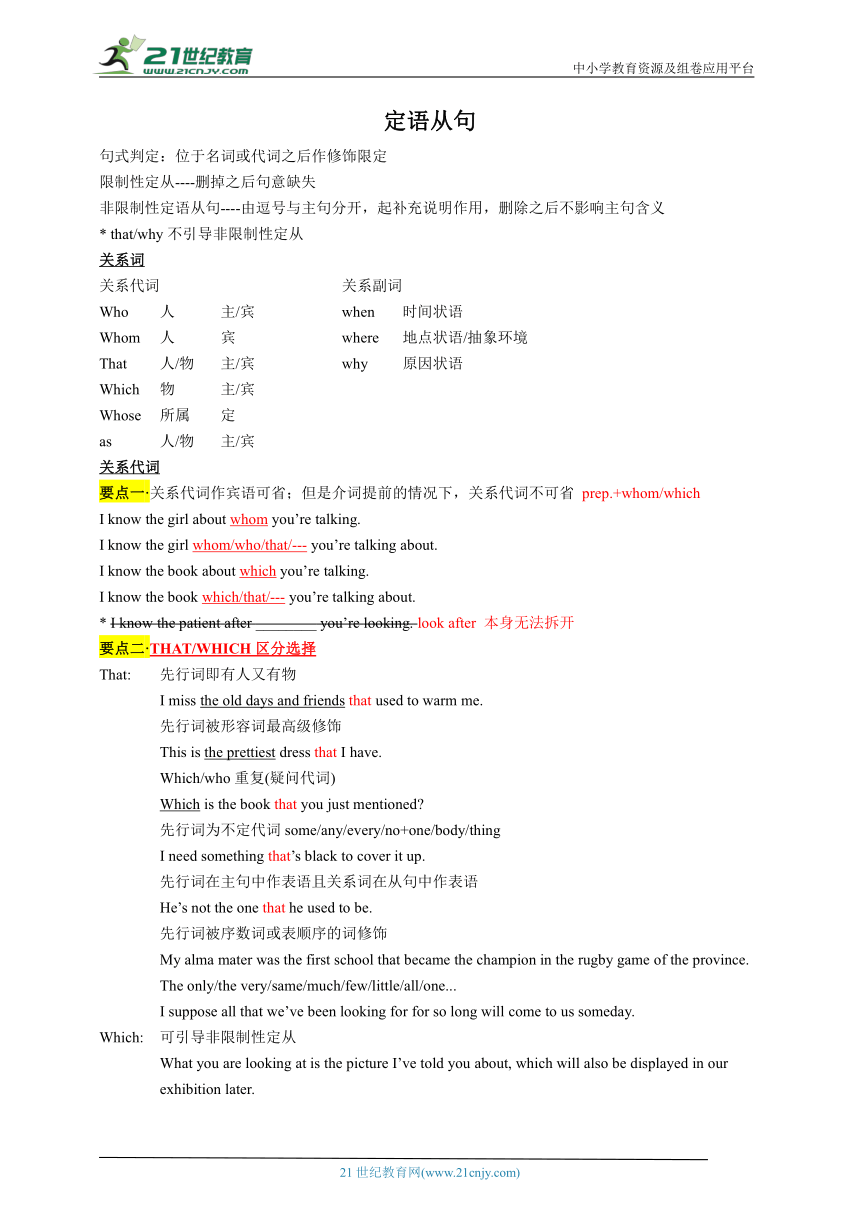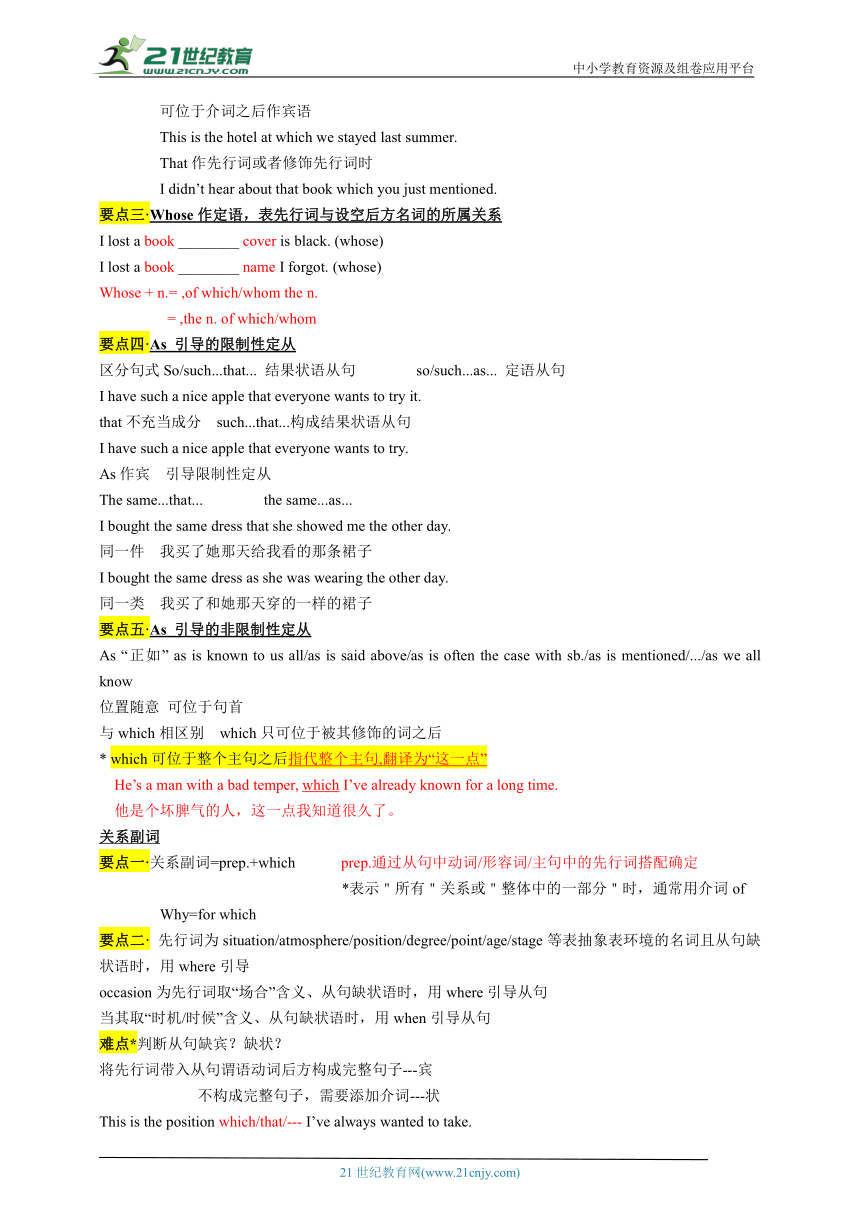高考英语冲刺复习学案 定语从句(含答案)
文档属性
| 名称 | 高考英语冲刺复习学案 定语从句(含答案) |  | |
| 格式 | zip | ||
| 文件大小 | 1.1MB | ||
| 资源类型 | 试卷 | ||
| 版本资源 | 人教版(2019) | ||
| 科目 | 英语 | ||
| 更新时间 | 2023-04-16 10:35:00 | ||
图片预览


文档简介
定语从句
句式判定:位于名词或代词之后作修饰限定
限制性定从----删掉之后句意缺失
非限制性定语从句----由逗号与主句分开,起补充说明作用,删除之后不影响主句含义
* that/why不引导非限制性定从
关系词
关系代词 关系副词
Who 人 主/宾 when 时间状语
Whom 人 宾 where 地点状语/抽象环境
That 人/物 主/宾 why 原因状语
Which 物 主/宾
Whose 所属 定
as 人/物 主/宾
关系代词
要点一·关系代词作宾语可省;但是介词提前的情况下,关系代词不可省 prep.+whom/which
I know the girl about whom you’re talking.
I know the girl whom/who/that/--- you’re talking about.
I know the book about which you’re talking.
I know the book which/that/--- you’re talking about.
* I know the patient after ________ you’re looking. look after 本身无法拆开
要点二·THAT/WHICH区分选择
That: 先行词即有人又有物
I miss the old days and friends that used to warm me.
先行词被形容词最高级修饰
This is the prettiest dress that I have.
Which/who重复(疑问代词)
Which is the book that you just mentioned
先行词为不定代词some/any/every/no+one/body/thing
I need something that’s black to cover it up.
先行词在主句中作表语且关系词在从句中作表语
He’s not the one that he used to be.
先行词被序数词或表顺序的词修饰
My alma mater was the first school that became the champion in the rugby game of the province.
The only/the very/same/much/few/little/all/one...
I suppose all that we’ve been looking for for so long will come to us someday.
Which: 可引导非限制性定从
What you are looking at is the picture I’ve told you about, which will also be displayed in our exhibition later.
可位于介词之后作宾语
This is the hotel at which we stayed last summer.
That作先行词或者修饰先行词时
I didn’t hear about that book which you just mentioned.
要点三·Whose作定语,表先行词与设空后方名词的所属关系
I lost a book ________ cover is black. (whose)
I lost a book ________ name I forgot. (whose)
Whose + n.= ,of which/whom the n.
= ,the n. of which/whom
要点四·As 引导的限制性定从
区分句式So/such...that... 结果状语从句 so/such...as... 定语从句
I have such a nice apple that everyone wants to try it.
that不充当成分 such...that...构成结果状语从句
I have such a nice apple that everyone wants to try.
As作宾 引导限制性定从
The same...that... the same...as...
I bought the same dress that she showed me the other day.
同一件 我买了她那天给我看的那条裙子
I bought the same dress as she was wearing the other day.
同一类 我买了和她那天穿的一样的裙子
要点五·As 引导的非限制性定从
As “正如” as is known to us all/as is said above/as is often the case with sb./as is mentioned/.../as we all know
位置随意 可位于句首
与which相区别 which只可位于被其修饰的词之后
* which可位于整个主句之后指代整个主句,翻译为“这一点”
He’s a man with a bad temper, which I’ve already known for a long time.
他是个坏脾气的人,这一点我知道很久了。
关系副词
要点一·关系副词=prep.+which prep.通过从句中动词/形容词/主句中的先行词搭配确定
*表示"所有"关系或"整体中的一部分"时,通常用介词of
Why=for which
要点二· 先行词为situation/atmosphere/position/degree/point/age/stage等表抽象表环境的名词且从句缺状语时,用where引导
occasion为先行词取“场合”含义、从句缺状语时,用where引导从句
当其取“时机/时候”含义、从句缺状语时,用when引导从句
难点*判断从句缺宾?缺状?
将先行词带入从句谓语动词后方构成完整句子---宾
不构成完整句子,需要添加介词---状
This is the position which/that/--- I’ve always wanted to take.
This is the position where I always feels awkward.
I miss the summer in which we spent all day sunbathing on the beach.
(spend all day sunbathing in summer)
注意区分
I miss the summer which we spent sunbathing on the beach.
(spend缺宾语 关系代词引导从句补齐成分)
要点三·The reason 作原因状语 可用why/for which/that/---
The way 作方式状语 可用that/in which/---
Prep.+关系代词+n.
She might come visit us,in which case you’re supposed to treat her to some snacks.
In 1963, the UN set up the World Food Programme, one of whose purposes is to relieve worldwide starvation.
小题训练:
1. She says that she’ll never forget the time she’s spent working as a secretary in our company.
2. A man with a bleeding hand hurried in and asked, ”Is there a hospital around I can get some medicine for my wounded hand ”
3. Many lessons are now available online, from students can choose for free.
4. We have entered into an age dreams have the best chance of coming true.
5. The book tells stories of the earthquake through the eyes of those lives were affected.
6. Like anything, it is possible to have too much of both, is not good for the health.
7. Many young people, most of were well-educated, headed for remote regions to chase their dreams.
8.He has made as much progress is enough for him to be admitted to Stanford University.
9.The number of smokers, is reported, has dropped by 17 percent in just one year.
10. Mr. Smith owned this oil painting until the early 1990s, he gave it to his grandson.
11. In ancient China lived an artist paintings were almost lifelike.
12. The little problems we meet in our daily lives may be inspirations for great inventions.
13. We will put off the picnic in the park until next week, the weather may be better.
14. Among the many dangers sailors have to face, probably the greatest of all is fog.
15. You must learn to read people, will be necessary if you work in a team.
16. Being a postman is not such an easy job it looks.
17. is known to us all, failure usually results from laziness while diligence can result in success.
18. After all this time, he still refuses to tell me the reason he lied.
19. Self-driving is an area _______ China and the rest of the world are on the same starting line.
20. Lily is highly recommended, under ________ supervise, I believe your company will certainly thrive.
思考:
1.
________ is known to us all that failure usually results from laziness while diligence can result in success.
________ is known to us all is that failure usually results from laziness while diligence can result in success.
2.
He refuses to tell me the truth for the reason ________ he’s afraid that I won’t trust him any more.
3.
It's because of the fact ________ he might get caught ________ he gave up his plan to rob the bank.
参考答案:
中小学教育资源及组卷应用平台
21世纪教育网 www.21cnjy.com 精品试卷·第 2 页 (共 2 页)
21世纪教育网(www.21cnjy.com)
that/which/---
where
which
when
whose
which
whom
as
as
when
whose
that
when
that
which
as
as
why
where
whose
思考
it作形式主语引导主语从句
what作从句主语引导主语从句
that引导同位语从句解释reason内容
that引导同位语从句解释fact内容;that与it's构成强调句,强调原因状语
句式判定:位于名词或代词之后作修饰限定
限制性定从----删掉之后句意缺失
非限制性定语从句----由逗号与主句分开,起补充说明作用,删除之后不影响主句含义
* that/why不引导非限制性定从
关系词
关系代词 关系副词
Who 人 主/宾 when 时间状语
Whom 人 宾 where 地点状语/抽象环境
That 人/物 主/宾 why 原因状语
Which 物 主/宾
Whose 所属 定
as 人/物 主/宾
关系代词
要点一·关系代词作宾语可省;但是介词提前的情况下,关系代词不可省 prep.+whom/which
I know the girl about whom you’re talking.
I know the girl whom/who/that/--- you’re talking about.
I know the book about which you’re talking.
I know the book which/that/--- you’re talking about.
* I know the patient after ________ you’re looking. look after 本身无法拆开
要点二·THAT/WHICH区分选择
That: 先行词即有人又有物
I miss the old days and friends that used to warm me.
先行词被形容词最高级修饰
This is the prettiest dress that I have.
Which/who重复(疑问代词)
Which is the book that you just mentioned
先行词为不定代词some/any/every/no+one/body/thing
I need something that’s black to cover it up.
先行词在主句中作表语且关系词在从句中作表语
He’s not the one that he used to be.
先行词被序数词或表顺序的词修饰
My alma mater was the first school that became the champion in the rugby game of the province.
The only/the very/same/much/few/little/all/one...
I suppose all that we’ve been looking for for so long will come to us someday.
Which: 可引导非限制性定从
What you are looking at is the picture I’ve told you about, which will also be displayed in our exhibition later.
可位于介词之后作宾语
This is the hotel at which we stayed last summer.
That作先行词或者修饰先行词时
I didn’t hear about that book which you just mentioned.
要点三·Whose作定语,表先行词与设空后方名词的所属关系
I lost a book ________ cover is black. (whose)
I lost a book ________ name I forgot. (whose)
Whose + n.= ,of which/whom the n.
= ,the n. of which/whom
要点四·As 引导的限制性定从
区分句式So/such...that... 结果状语从句 so/such...as... 定语从句
I have such a nice apple that everyone wants to try it.
that不充当成分 such...that...构成结果状语从句
I have such a nice apple that everyone wants to try.
As作宾 引导限制性定从
The same...that... the same...as...
I bought the same dress that she showed me the other day.
同一件 我买了她那天给我看的那条裙子
I bought the same dress as she was wearing the other day.
同一类 我买了和她那天穿的一样的裙子
要点五·As 引导的非限制性定从
As “正如” as is known to us all/as is said above/as is often the case with sb./as is mentioned/.../as we all know
位置随意 可位于句首
与which相区别 which只可位于被其修饰的词之后
* which可位于整个主句之后指代整个主句,翻译为“这一点”
He’s a man with a bad temper, which I’ve already known for a long time.
他是个坏脾气的人,这一点我知道很久了。
关系副词
要点一·关系副词=prep.+which prep.通过从句中动词/形容词/主句中的先行词搭配确定
*表示"所有"关系或"整体中的一部分"时,通常用介词of
Why=for which
要点二· 先行词为situation/atmosphere/position/degree/point/age/stage等表抽象表环境的名词且从句缺状语时,用where引导
occasion为先行词取“场合”含义、从句缺状语时,用where引导从句
当其取“时机/时候”含义、从句缺状语时,用when引导从句
难点*判断从句缺宾?缺状?
将先行词带入从句谓语动词后方构成完整句子---宾
不构成完整句子,需要添加介词---状
This is the position which/that/--- I’ve always wanted to take.
This is the position where I always feels awkward.
I miss the summer in which we spent all day sunbathing on the beach.
(spend all day sunbathing in summer)
注意区分
I miss the summer which we spent sunbathing on the beach.
(spend缺宾语 关系代词引导从句补齐成分)
要点三·The reason 作原因状语 可用why/for which/that/---
The way 作方式状语 可用that/in which/---
Prep.+关系代词+n.
She might come visit us,in which case you’re supposed to treat her to some snacks.
In 1963, the UN set up the World Food Programme, one of whose purposes is to relieve worldwide starvation.
小题训练:
1. She says that she’ll never forget the time she’s spent working as a secretary in our company.
2. A man with a bleeding hand hurried in and asked, ”Is there a hospital around I can get some medicine for my wounded hand ”
3. Many lessons are now available online, from students can choose for free.
4. We have entered into an age dreams have the best chance of coming true.
5. The book tells stories of the earthquake through the eyes of those lives were affected.
6. Like anything, it is possible to have too much of both, is not good for the health.
7. Many young people, most of were well-educated, headed for remote regions to chase their dreams.
8.He has made as much progress is enough for him to be admitted to Stanford University.
9.The number of smokers, is reported, has dropped by 17 percent in just one year.
10. Mr. Smith owned this oil painting until the early 1990s, he gave it to his grandson.
11. In ancient China lived an artist paintings were almost lifelike.
12. The little problems we meet in our daily lives may be inspirations for great inventions.
13. We will put off the picnic in the park until next week, the weather may be better.
14. Among the many dangers sailors have to face, probably the greatest of all is fog.
15. You must learn to read people, will be necessary if you work in a team.
16. Being a postman is not such an easy job it looks.
17. is known to us all, failure usually results from laziness while diligence can result in success.
18. After all this time, he still refuses to tell me the reason he lied.
19. Self-driving is an area _______ China and the rest of the world are on the same starting line.
20. Lily is highly recommended, under ________ supervise, I believe your company will certainly thrive.
思考:
1.
________ is known to us all that failure usually results from laziness while diligence can result in success.
________ is known to us all is that failure usually results from laziness while diligence can result in success.
2.
He refuses to tell me the truth for the reason ________ he’s afraid that I won’t trust him any more.
3.
It's because of the fact ________ he might get caught ________ he gave up his plan to rob the bank.
参考答案:
中小学教育资源及组卷应用平台
21世纪教育网 www.21cnjy.com 精品试卷·第 2 页 (共 2 页)
21世纪教育网(www.21cnjy.com)
that/which/---
where
which
when
whose
which
whom
as
as
when
whose
that
when
that
which
as
as
why
where
whose
思考
it作形式主语引导主语从句
what作从句主语引导主语从句
that引导同位语从句解释reason内容
that引导同位语从句解释fact内容;that与it's构成强调句,强调原因状语
